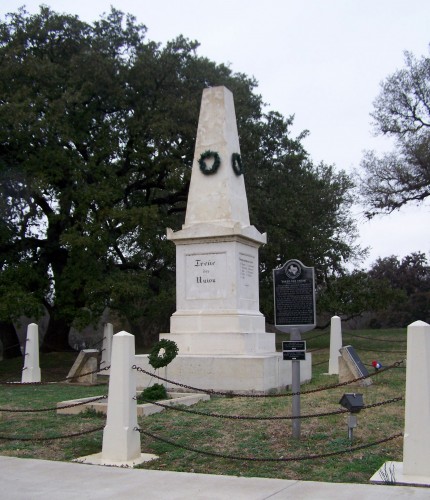Taking it into my head to go to the local Chick-fil-A last Wednesday was another one of those odd things, like getting involved in the Tea party which happened because of a friend. In this case, a purely on-line friend; the friend who inveigled me into attending an early San Antonio Tea Party planning committee meeting was a blog-friend whom I had actually met on a couple of social occasions, so when he said, ‘Hey, we need someone to write press releases and stuff, and you’re a writer and you were a broadcaster, so can ya?’ And being a stubborn independent libertarian-conservative sort, it seemed like a good idea. That the planned event very shortly turned into an all-Texas blow-out with 15,000 to maybe as many as 20,000 in attendance … well, I didn’t have anything much to do with that … I just kept my head down and sent out the press releases and made myself available for local media interviews.
 Sgt. Mom
Sgt. Mom
The Nueces Fight – Conclusion
Late in the fall of 1862, under the mistaken assumption that they had been offered a thirty-day amnesty by the Governor of Texas and allowed to depart Texas unmolested rather than take the loyalty oath, a party of Unionists gathered together at Turtle Creek in Kerr County. They elected a settler from Comfort named Fritz Tegener as their leader, and Henry Schwethelm as second. Their number included Phillip Braubach, who had served as the sheriff of Gillespie County, and Captain John Sansom, a Texas Ranger before and after the war, and also the sheriff of Kendall County, two sons of Edwin Degener, a prominent free-thinker from Sisterdale, Heinrich Steves, whose large family had helped establish Comfort, and the Boerner brothers, one of whom had married a Steves daughter. Heinrich Stieler was also one of them; he was Henry Schwethelm’s brother-in-law and son of Gottlieb Stieler, an early settler whose family later established a ranch between Comfort and Fredericksburg which still exists today.
A Little Bit of History – The Nueces Fight
As I am going up to Comfort, Texas on the 11th of August, to take part in the 150th anniversary observences of the Nueces Fight, and since this Civil War event is very little known outside of Texas — herewith some background. It’s longish, so in two parts, the second part posted tomorrow.)
Update – Chick-fil-A
The daughter unit was working today, so we waited and had late-lunch, early dinner. The local Chick-fil-A nearest us was jammed, even more than it was last Saturday, and the line of cars for the drive-through window went around the building, through the parking lot of the business next to it, out to the access road through the shopping center, down the access road to the highway access road. The cashier told us that at lunch today, the line went all the way to the Costco, about a third of a mile away.
The Strange Case of l’affaire du Poulet Filet
Yep when the going gets weird, the weird turn pro … Here we are, shaking our heads in amazed disbelief that now a fast-food chain purveying tasty chicken entrees, distinguished among other fast-food outlets only for a corporate policy of being closed on Sunday and a rather witty advertising series featuring illiterate cows urging us to eat chicken … is the hill to be defended in the culture war. That would be the newly-vicious cultural war between the forces of tolerant political correctness and those conservative and libertarian defenders of free-market principles as well as the freedom of belief and expression. Most of us of that persuasion are actually rather stunned at how suddenly Chick-Fil-A is now the demon that must be defeated! And defeated by any means, fair, foul, shrill or underhanded as is required by the mission, naturally. Is there some PC target of the week decided upon? Last time I looked around it was the Koch Brothers who were the Goldstein o’the Week. One can hardly keep up without a scorecard.

